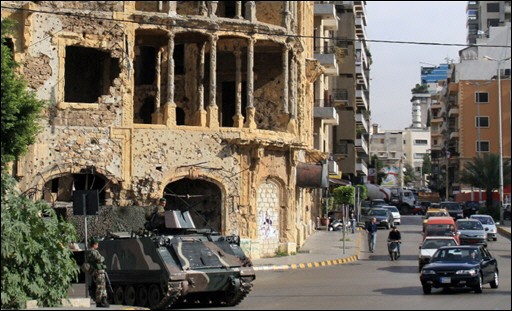 By Daniel Williams, Dec. 4 (Bloomberg) — The shooting death of a Shiite Muslim youth in Beirut increases the risk of converting Lebanon’s political power struggle into a sectarian conflict. Portraits of Ali Ahmed Mahmoud, 20, who died during a Shiite-Sunni Muslim street fight yesterday, hung at downtown plazas occupied by Hezbollah, the Shiite party that is campaigning to topple Lebanon’s pro-Western government. Placards declared Mahmoud a martyr.
By Daniel Williams, Dec. 4 (Bloomberg) — The shooting death of a Shiite Muslim youth in Beirut increases the risk of converting Lebanon’s political power struggle into a sectarian conflict. Portraits of Ali Ahmed Mahmoud, 20, who died during a Shiite-Sunni Muslim street fight yesterday, hung at downtown plazas occupied by Hezbollah, the Shiite party that is campaigning to topple Lebanon’s pro-Western government. Placards declared Mahmoud a martyr.
Army units appeared at intersections that separate Shiite and Sunni areas. A row of a dozen armored personnel vehicles topped with recoilless rifles lined a boulevard between KasKas, the scene of the killing, and the Shiite neighborhood of Dahiyeh. “We don’t know what is going to happen next,” said Hamed Jabasini, 40, a chocolate merchant. “This is something the leaders bring to us by their politics.”
The opposition protests, aimed at toppling Prime Minister Fouad Siniora, began Dec. 1 One of the main opposition is. Hezbollah’s militia triggered war with Israel in July when it abducted two Israeli soldiers. The party wants to get more say in government and divert Lebanon from close ties with the U.S. Iran and Syria back Hezbollah in this quest. The Bush administration supports Siniora and regards Hezbollah as a terrorist tool of the governments in Tehran and Damascus.
The mass protests outside Siniora’s headquarters have been peaceful. Mahmoud’s death was the first associated with the demonstrations.
Nonetheless, warnings of violence and a slide into civil war are abundant. In Lebanon, strife among Sunnis, Shiites, Christians, Druze, and Palestinian refugees marked a 15-year civil war that ended in 1990.
“If things keep rising in this manner, they will definitely lead to a clash,” Maronite Christian Patriarch Nasrallah Butros Sfeir told worshippers at Mass yesterday.
Sectarian Conflict
The KasKas killing shows how a kind of hooligan-like street fight can set the emotional stage for sectarian conflict.
Hezbollah demonstrators were marching along a boulevard that skirts KasKas toward downtown. The marchers hurled insults at Sunnis and at the memory of Rafiq Hariri, the former prime minister killed in 2005 by a car bomb. Hariri was Sunni.
Youths from KasKas, a neighborhood of mid-rise apartments, rushed to the street and hurled stones, Jabasini and other residents said. Hezbollah protesters then stormed a side road.
“They were going to come in and trash our neighborhood,” said Khaled Hashem, 20, a thick-armed mechanic.
Hashem sat on a curb today with five friends who took part in the stone-throwing. In an interview, they said they were all friends of Mahmoud, who lived in the neighborhood.
Shiites, Sunnis
“Ali was Shiite, but it doesn’t make any difference to us,” said a companion, Tewfik Turkawi, a 20-year-old automobile electrician and a Sunni. “A few hours before, we were sitting right here, laughing and singing.”
It was all a strange happenstance, they said. When the Hezbollah-led group marched down the street, Mahmoud began to throw stones at them.
“Then he realized who they were, and wanted to join them,” Hashem said.
Mahmoud walked toward them and somebody shot him. His friends said the gunfire came from the Shiite crowd.
“This was a death for nothing,” Hashem said. “You know, it would be better if the leaders threw stones at each other and we got to watch.”
Other residents, who declined to give their names, said the shots were fired by Palestinians from a nearby refugee camp or by a sniper hidden in an apartment building.
Hashem, Tewfik and friends had little to say about the political standoff downtown.
Nasrallah, Hariri
Hezbollah is led by Hassan Nasrallah, a turbaned cleric. Among the supporters of Siniora is Saad Hariri, son of the slain former prime minister.
“All I know is that the ones who came here last night were with Nasrallah. We are with Hariri,” Hashem said. “They better not come back.”
Around the corner, Jabasini, the chocolatier, said fighting already broke out in KasKas the night of Dec. 2. Sunni youths stoned Shiite marchers without provocation. “Yesterday was retaliation day,” he said.
Jabasini, himself a Sunni, but anti-Siniora, was preparing to fix his white delivery van. The window in the front was cracked and the back window shattered.
“This one was from a Sunni stone,” he said gesturing to the front pane. “The Shiites did the one at the back. Take a look. This van is Lebanon.”
: Daniel Williams in Beirut dwilliams41@bloomberg.net .



